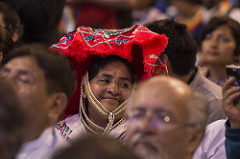On 16-17 March, high-level government officials, representatives of the UN, regional development banks, academia and other stakeholders will gather at a symposium on the Promotion of an Inclusive and Accountable Public Administration for Sustainable Development in Cochabamba, Bolivia.? The symposium is organized by the Government of Bolivia with the support of DESA (DPADM).
“The 2030 agenda and the Sustainable Development Goals adopted by the United Nations last year provide an unprecedented opportunity to deepen and enhance the transformation of our development models, in a sustainable manner”, said Mr. Lenni Montiel, Assistant Secretary-General for Economic Development of UNDESA during his opening remarks, “The 2030 Agenda is also presented as a transformational agenda because it intends to irreversibly end poverty in all its dimensions. It also aims to reduce inequality between countries and within each of them.”
 Countries with capable public institutions show better results on the ground in public service delivery, in areas such as education, health care, water and sanitation, as well as women’s participation. “Achieving the SDGs requires the alignment and coherence between policies and legislative efforts. Whole of Government approaches are critical.? Countries have been revamping or creating various kinds of coordination institutions and mechanisms.? Various countries have created special units or committees at the highest level to guide the implementation and follow-up to Agenda 2030,” Mr. Montiel said.
Countries with capable public institutions show better results on the ground in public service delivery, in areas such as education, health care, water and sanitation, as well as women’s participation. “Achieving the SDGs requires the alignment and coherence between policies and legislative efforts. Whole of Government approaches are critical.? Countries have been revamping or creating various kinds of coordination institutions and mechanisms.? Various countries have created special units or committees at the highest level to guide the implementation and follow-up to Agenda 2030,” Mr. Montiel said.Knowledge sharing and showcase best practices
The symposium provides an opportunity to exchange knowledge on policies, strategies, innovative practices and lessons learned in building effective and inclusive public administration. During this two day event, experts from around the world will present and showcase their own experience, successful stories and lessons learned on topics such as integrated policy making, corruption prevention, institution building, role of social media to engage the youth, indigenous people’s participation and gender balance in decision-making.
The sessions will focus on ethical leadership, policy and institutional coordination and integration, and citizen engagement.

